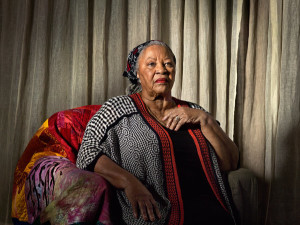I won’t forget the embarrassment I felt when discussing my favorite authors with a friend just last summer.
She and I had gone to high school together and enjoyed reading some of the same books at the time. We were meeting up for only the second time in four years, and it wasn’t long before our conversation turned to literature. As we were rallying off the books that we had been reading, my friend made an interesting conjecture.
“You seem to read only male authors…particularly white male authors.”
I was taken aback, but after several seconds, I regained my composure.
“That’s not true! I read Wole Soyinka and Chinua Achebe in my World Lit class, and I love Rachel Carson and Donna Tartt and…” (dare I mention J.K. Rowling?)
“Fine,” she said, “but how many non-white, female authors have you read?”
I was at a loss. In fact, I hadn’t read any.
 The next day, I picked up a copy of Toni Morrison’s Song of Solomon and began my education. Of course I knew about Morrison and her Nobel Prize, and I really did plan on reading her eventually, but, for whatever reason, I always found another author that I had to read first. One month later, however, after finishing Song of Solomon and Beloved, I was ready to call her one of my favorite authors.
The next day, I picked up a copy of Toni Morrison’s Song of Solomon and began my education. Of course I knew about Morrison and her Nobel Prize, and I really did plan on reading her eventually, but, for whatever reason, I always found another author that I had to read first. One month later, however, after finishing Song of Solomon and Beloved, I was ready to call her one of my favorite authors.
Apart from her masterful style, what drew me most to Morrison’s writing was her ability to fashion a reality that seemed simultaneously authentic and unique. Entering the worlds of Milkman and Sethe was like visiting a foreign country for the first time. The unfamiliarity of the place was its charm. Every character’s name, every town, every family, felt new and interesting. Every dialogue was an opportunity to learn.
Before Morrison, I had fallen into a trap that I think ensnares many readers. With few exceptions, I had been reading authors of my own gender, ethnicity, socioeconomic status, political ideologies, etc. In short, I was reading authors who viewed the world through lenses not unlike my own. I had read some truly magnificent books, but I was limiting literature’s potential to enrich my understanding of the world. I needed someone to disentangle my partialities and open my mind.
For me, that someone was Toni Morrison. For another reader, it may be a foreign author, or someone on the opposite side of the political spectrum, or a scientist who writes only nonfiction. Inevitably, the decision to try out one new author or genre will lead to a more diverse and complete reading list.
A year after our previous conversation, when my friend and I were both back home riding around our old neighborhood, our conversation turned again to literature.
“Would you consider the reading you do outside of school, at home, without anyone to discuss the books with educational?” I asked.
“I think the reading of any type of literature is educational.” She said. “Reading is the most effective way to enter the mind of another person, and what could be more educational than that?”
If literature does in fact allow the reader to inhabit the mind of the author, we can do ourselves no greater disservice than reading a homogenous circle of authors. Each time we take the risk of reading an unfamiliar author, however, we learn to better understand the world, its myriad cultures and peoples, and our place among them.


Comments are closed.